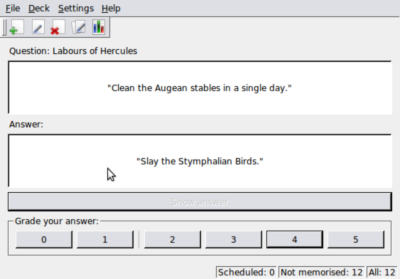Learning a Monologue
27 Jun 2012

I’ve been asked to give a reading at an upcoming wedding–and I’m truly honoured. I plan to learn it “off by heart”.
It’s not your typical reading – it’s a list of bullet points under two headings (“Marry” and “Not marry”) by a certain Charles Darwin. That’s why I want to memorise it: it’ll require a degree of enunication and performance, beyond simply reading it out without making a mistake.
This is, you may have guessed, the pressing need behind my recent perusal of flashcard programs. It doesn’t fit neatly into that technique, though: I need to learn a passage of writing, not the answers to questions or prompts.
Google results are unpromising. Repetition comes up, rehearsal, using recordings of the other lines as prompts - things I’ve already thought of. Rehearsal and self-recording don’t really fit - I can’t rehearse until I’ve learned the passage, since it’s a monologue. I’ve had a decent go at reading the passage again and again, and found that self-recording does help to a surprising degree. (If you’ve passed me on the guided busway mumbling along to my headphones, it’s because I’m uttering the words in time with myself, as it were)
In an idle hour I knocked up a technical solution to translate the problem into the “flashcard domain”. It might be useful to others, so I’ll share it here.
Problem - you want to learn a list of things, or a recitation using flashcards. But prompt–response doesn’t seem to help
Solution - break up the subject into lines. The prompt is line n and the correct answer is line n+1.
I expect this to work because I know from experience that whenever I hear a song finish, my mind starts the next track from the album automatically. I can’t listen to Sticky Fingers on shuffle, it’s not right.
To turn your text into flashcards, use this spreadsheet template.
What comes after “Slay the Stymphalian Birds”?
Tags: memory, tool, technique, mindhack
< Previous post | Next post >Favourite posts
- On wiggly lines and being normal
- On infinite villages
- Running a race backwards
- Brainmaking
- Their tables were stored full, to glad the sight
- The structure of a smell
Recent posts
- Start your holidays with a meta-alarm
- PGN files from handwritten chess notation
- Souvenirs des villes européennes
- Pic'n'mix reinvented
- Super slow-mo Tetris
Blog archives
Posts from 2012, 2013, 2014, 2015, 2016, 2017, 2018, 2019, 2020, 2021, 2022, 2023, 2024.